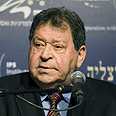
Binyamin Ben-Eliezer
צילום: יותם פרום
The power of words
Minister Ben-Eliezer’s tough message to Tehran may be the right approach
Binyamin Ben-Eliezer, who this week threatened Iran with destruction, drew smiles in Israel. The prime minister, defense minister, and foreign minister refrained from responding. I personally saw one of them chuckling. “Oh, well, so he said it, so what?” said a close associate of one of our top leaders.
The initial inclination is to agree with them and be angry at our infrastructure minister, who has placed the Israeli government’s way of expression on the same level with that of our archenemy in Tehran. However, Ben-Eliezer created an impact that no other Israeli was able to create this week.
Everyone this week was talking about defensive measures and about protecting the home front – while he spoke of our right and our ability to respond. At times it is not such a terrible thing to remind the world that Israel has such right and ability, which may hurt. At times, this is worth as much as several international trips where local leaders are told what Israel can do to those who think about developing nuclear capabilities.
True, this is not politically correct, but in our environment, which is neither America nor Europe, as Defense Minister Ehud Barak noted, we speak in a different language. We did not decide this, but we live here, in the Near East.
The fact is that nobody has been able thus far to stop Iran’s race to a nuclear military capability and its direct threats on Israel by using common diplomatic language. Perhaps a warning such as the one uttered by Ben-Eliezer, which presents the Iranians with a price tag that Israel has the ability to exact, would serve to melt Ahmadinejad’s cruel arrogance. It is possible that in this case, the language will make the difference.
Drills aren’t enough
This week started with the tensions vis-à-vis Syria, which happened to coincide with the large-scale home front drill in Israel. And so there we were, talking about possible peace a day before and a day after the drill, and in between talking about possible war and the need to prepare for missile attacks, 100 to 150 killed Israelis, thousands of wounded Israelis, and a paralyzed economy.
So we had a drill, the government practiced, the cabinet practiced, emergency authorities and headquarters practiced. Yet the mayor of one northern town told me that nobody spoke to him about the drill, and that an envelope with some material about it only arrived the day of the drill. Besides, he said, the bomb shelters in his community were not renovated and nothing has changed since the cursed war of summer 2006.
Indeed, a national emergency authority was established, a situation room was built near the Prime Minister’s Office, and a decision has been taken to hand out gas masks. Indeed, decisions were made to fortify some homes in the home front and renovate bomb shelters with donation money and local authority funds. Indeed, the cabinet discusses home front issues much more frequently these days.
Yet in practice, as some municipal leaders have said, we are prepared to face a missile war against the home front just about as much as we are prepared for peace with Syria. The big problem with wars is that they are not won through words, and certainly not through drills. It is unclear whether this lesson, learned from the Winograd Commission and in general, has been internalized by the Israeli government.










